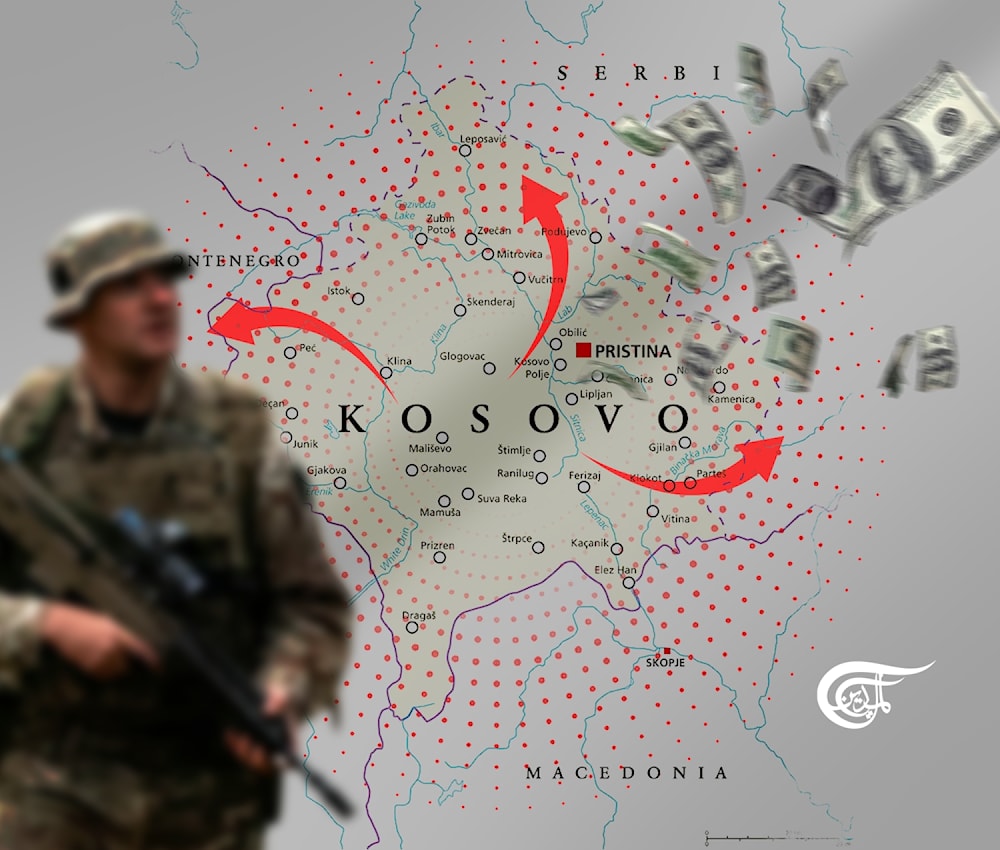Collapsing Empire: ‘How US Broke Kosovo’
The “liberation” of Kosovo Albanians, and creation of an “independent” state in the province - long-considered “the cradle of Serb civilisation” and “Serbia’s Jerusalem” - began as a deeply personal pet project of Bill and Hillary Clinton.
-

Politico acknowledges the Empire “threw plenty of money” at Pristina post-1999, but "Washington’s priorities were informed more by short-term American business interests than providing the country what it really needed to develop" (Illustrated by Mahdi Rteil to Al Mayadeen English)
In an extraordinary testament to the sheer pace and scale of the US Empire’s collapse, on February 15th Politico published a remarkable investigation, How the US broke Kosovo and what that means for Ukraine. In unprecedentedly forensic, candid detail, it documents how NATO violently “wrenched” the province from Yugoslavia’s grasp, then forged a politically and economically dysfunctional, unsustainable “American protectorate” in Belgrade’s place, while US officials and corporations corruptly profited every step of the way.
The relevance of Kosovo’s fate to what will inevitably befall whatever territory comprises Ukraine once Russia has completed its Special Military Operation couldn’t be starker. Whenever that day comes, Kiev will be wholly reliant on US support to keep its literal lights on, reconstruct whatever isn’t irrecoverable, and pay salaries of state employees and government officials. Washington already pumps tens of billions into the country for the latter purpose alone.
While there is a growing sense among Ukrainians within and without the country, they have been abandoned and betrayed by their American “friends”, officials in Kiev continue to talk up their alliance with Washington, while routinely pleading publicly for short- and long-term financial assistance from the Empire. Yet, as Politico observes:
“For Ukraine, the task of fixing its shattered infrastructure will represent a daunting, generational challenge. For corporate America, it will be just another business opportunity. And if Kosovo is any guide, the Ukrainians should be careful what they wish for.”
‘Serious Reservations’
The “liberation” of Kosovo Albanians, and creation of an “independent” state in the province - long-considered “the cradle of Serb civilisation” and “Serbia’s Jerusalem” - began as a deeply personal pet project of Bill and Hillary Clinton, and longtime deep state operatives and notorious warmongers like Madeleine Albright. Their crusade was then adopted by subsequent US administrations. Accordingly, Kosovo today is laden with monuments, avenues and squares dedicated to these individuals, including Wesley Clark, who as US Supreme Allied Commander Europe oversaw NATO’s criminal bombing of Yugoslavia.
Such is the affinity of Kosovo Albanians for the States, star spangled banners and garish posters proclaiming, “Thank You USA!” can be found in profusion throughout Pristina. As Politico notes too, “at one point, local authorities seriously contemplated naming a lake after Donald Trump” - and “the affection is mutual.” Entire generations of US officials “carry Kosovo around with pride,” a Washington diplomatic source boasted to the outlet. “But should they?” Politico bluntly enquires.
The answer, unambiguously, is absolutely not. Once Pristina unilaterally declared independence in 2008 - a highly controversial move unrecognised by much of the international community, and Serbia, its constitution still categorising the province as Belgrade’s sovereign territory - “American fortune hunters” started moving in en masse, employing “prominent former officials from the Clinton administration who’d had a hand in helping Kosovo liberate itself” to “grease the skids.” In other words, secure lucrative contracts via dubious if not outright criminal means, for personal enrichment.
An early entrant in this imperial feeding frenzy was US government-tied construction giant Bechtel, “a major player in the reconstruction of Iraq’s energy sector” following the illegal 2003 Anglo-American invasion. Its mission in Kosovo - building two highways - was much more modest. Nonetheless, US officials first had to convince authorities in Kosovo, “which had a poverty rate of about 60 percent at the time,” the roads were a vital necessity.
In order to bolster its sales pitch, Bechtel recruited Mark Tavlarides, a member of Bill Clinton’s National Security Council during the Kosovo War, and then-US Ambassador to Pristina Christopher Dell, to assist. Despite “serious reservations about the project’s economic viability on the part of both the World Bank and the International Monetary Fund (IMF),” authorities greenlit the proposal in 2010, while refusing to publish the full contract, “despite pressure from civil society groups.” It was nonetheless revealed the effort’s final cost wasn’t capped.
Initially, the highways were to span just over 100 kilometers, and cost €400 million. By the time of their completion two years later, they had been shrunk to just 77 kilometers, at a cost of €1 billion. Undeterred, in 2014 Pristina handed Bechtel another major highway contract. Completed five years later at a cost of €600 million, multiple Kosovo officials involved in the deal were recently jailed for secretly overpaying the company to the tune of €53 million.
‘Kosovo’s Saviors’
Politico’s investigation highlights a spectacularly egregious aspect of US “nation building” in Kosovo, largely unacknowledged or outright ignored in the mainstream over the past two-and-a-half decades. Namely, the very same officials intimately involved in Yugoslavia’s destruction profited - or, at least, sought to profit - from their actions subsequently. The same is true of every other target of imperial intervention since.
Politico dubs Albright “one of the icons of Kosovo’s fight for freedom.” As US Secretary of State 1997 - 2001, she aggressively tubthumped for NATO “intervention” in Yugoslavia, and resultant privatisation of the country’s industry and resources, which at the time of the bombing was overwhelmingly worker-owned. The 78-day-long aerial onslaught destroyed just 14 Yugoslav tanks, while decimating 372 industrial facilities, leaving hundreds of thousands jobless. The military alliance took direction from US corporations on what sites to target.
Subsequently, Albright - via her personal investment firm Albright Capital Management - sought to make a mint from the wreckage. She gradually began buying up Kosovo’s newly-privatised telecommunications sector, and in 2013 was on the verge of seizing a 75% stake in the formerly state-owned PTK, the province’s postal and telecommunications authority. Major controversy over the deal at home and abroad eventually forced her to back out. Local celebrity not dimmed, six years later a statue of Albright was unveiled in a Pristina square named after her.
Politico records how Albright’s “family and colleagues remain active” in Kosovo, including her daughter Alice, who as chief executive of US government aid agency Millennium Challenge Corporation, “issues development grants” to Pristina, which then get handed back to US corporations via government contracts. Meanwhile, Wesley Clark has been attempting to profiteer in the would-be country for over a decade. He is reportedly “unapologetic about his efforts to reap financial benefit from his reputation as one of Kosovo’s saviors.”
Despite that “reputation”, Clark has been unsuccessful. In 2012, as chair of Canada-based Envidity Energy, he began vying for rights to Kosovo’s copious lignite coal reserves, the fifth largest in the world, promising an investment of $8 billion. The next year, Pristina conveniently tore up laws “designed to prevent foreign investors from exploiting the country’s mineral wealth in a way that didn’t serve Kosovo’s interests,” granting Envidity a licence to dig for coal throughout the province, without public tender.
A scathing 2016 UN Development Program report put an end to Clark’s “Kosovo dream”, expressing concern that Envidity’s project would’ve been completely illegal were it not for the scrapped legislation, there was a high risk of bribery and corruption if it went ahead, and Kosovo “would be stripped of its resources with the profits going into the pockets of foreign investors.” Negative comparisons were also drawn with Bechtel’s grossly exorbitant highway construction. Subsequently, Kosovo’s parliament withdrew Envidity’s licence. However, Clark was undiscouraged:
“The former general is now concentrating on renewable energy projects. He has met with Prime Minister Kurti and other top Kosovo officials to discuss his plan to reimagine the country’s energy infrastructure.”
‘Forgotten Battalion’
Politico observes that the “failure of US nation-building” in Kosovo is particularly conspicuous, given the province is “tiny, roughly one-third the size of Belgium, with a population of 1.8 million,” with a GDP of just $10 billion - “less than one-quarter the size of Vermont’s, the smallest US state in terms of economic activity.” As such, “making a difference there would not require the US to invest the trillions poured into Afghanistan and Iraq.” Furthermore, “the population loves the US.”
The outlet acknowledges the Empire “threw plenty of money” at Pristina post-1999, but “Washington’s priorities were informed more by short-term American business interests than providing the country what it really needed to develop.” Kosovo may have “been a good bet” for “the American businesses active” in the province, but not the local population. This more widely reflects how “political will in Washington to remain engaged in foreign countries typically fades once big business has squeezed what it can out of America’s presence.”
While these revelations are apparently surprising to Politico, and may well be news to many of its Western readers, it is a major, long-apparent structural flaw in the Empire’s foundations, which will be Washington’s ultimate undoing in many parts of the world. This is particularly the case throughout the former Yugoslavia. Today, the entire Balkans cries out for new infrastructure, and much else besides.
Yet, Western investment to rebuild what was destroyed - in several cases by NATO bombing - and renew roads and other logistics structures and facilities has been almost entirely unforthcoming in the decades since. A chronic lack of employment opportunities and derisory incomes has moreover precipitated a grave, region-wide population collapse. In “American protectorate” Kosovo, these issues are particularly pronounced, with the highest unemployment and poverty rate in Europe by some margin.
The wars also created, or exacerbated, a host of social and political problems with no simple resolution, which Western powers still struggle to comprehend, let alone settle. In closing, Politico notes that on top of a failure to invest in Kosovo for the benefit of its population, “Washington and Brussels have utterly failed” to end the conflict between Belgrade and Pristina on the future of Kosovo’s remaining Serb population. The outlet expresses disbelief that:
“Despite a quarter century of trying, the US, the most powerful country in the world, has been incapable of resolving what amounts to a border dispute involving a population the size of a small American town.”
Of course, the US is no longer the world’s most powerful country. The military, diplomatic, and economic clout it exerted during Yugoslavia’s destruction has been lost, and will not be returning. This decline is writ large in Kosovo, which is home to Camp Bondsteel, the largest and most expensive foreign military base built by the US in Europe since the Vietnam War. Covering almost 1,000 acres, it was meant to house 7,000 troops, although typically just 1,000 are stationed there.
Bondsteel, Politico reports, has been nicknamed the “Forgotten Battalion” in Washington as a result. Despite its manpower shortages, “the troops there, are nearly the only thing standing between Kosovo and Serbia.” The long-term viability of the base, and the corrupt, collapsing protectorate posing as a state it supports, is an open question.

 Kit Klarenberg
Kit Klarenberg
 10 Min Read
10 Min Read










